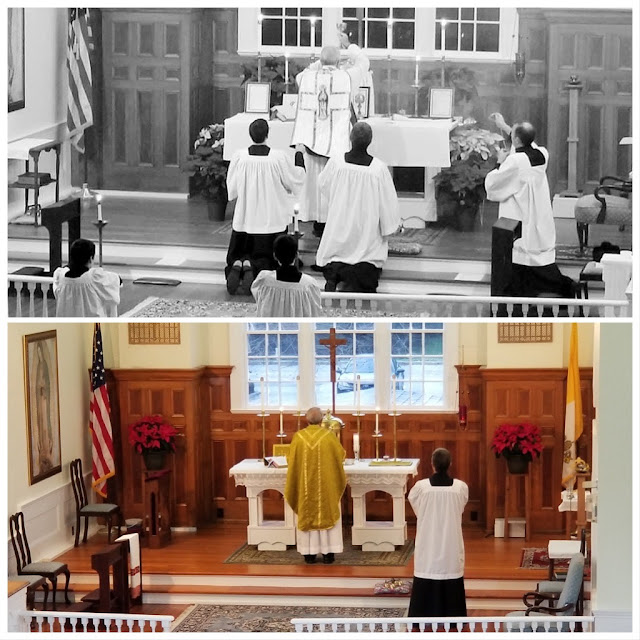Pastor’s Letter
Dear Parishioners,
Happy New Year. Yes, you read that correctly. Today is the First Sunday of Advent and the beginning of our Liturgical New Year. In our three-year cycle of Lectionary Readings for Sunday, we now begin year “C.” For daily Mass, it is Year 2. Did you know that if you attended Mass every day for three years, you would hear about 90% of the Bible read at Mass?
Of course, apart from the Lectionary, there are Scriptures for the official Introit, Offertory, and Communion antiphons. So, there’s plenty of the Bible in our Catholic Mass revised after Vatican II.
You might have to be a Church geek to know that since Vatican II, there have been many complaints about the way the revised Mass is celebrated compared to the older form. The so-called “new” Mass became mandatory in the new liturgical Year of Advent 1969. It was the new Roman Missal of 1970 that has had a few updates since that time, the most recent in 2011.
The complaint is that the older Mass was/is celebrated in a more reverent way, with an ethos that instilled awe, wonder, and reverence among those participating, including the priest. It was celebrated in a more formal way, highly choreographed, and with rigid rubrics (directions) on how to celebrate it. The church building was to be used only for prayer, before, during, and after Mass, which meant no socializing, only prayer during Mass and before and after Mass, prayer before the tabernacle or any of the images of the saints. The Mass itself had a great deal of sacred silence. The Roman Canon (First Eucharistic Prayer) was offered by the priest in a hushed, almost silent, voice, as were many of the other prayers.
Vatican II never intended for the Mass to become casual, sloppy, or banal. The implementation of the “new” Mass, though, seemed to encourage these things, with the mentality that new and improved was better than old and stale.
The greatest problem with the “new” Mass in my most humble opinion has to do with casualness, a loss of the sense of the sacred by the priest and congregation and inappropriate musical idioms dragged into the Mass based on passing musical fads young people enjoy. In my opinion, too, I think standing for Holy Communion, receiving in the hand and on the run has diminished the sense of awe and respect Catholics once had for Holy Communion, especially when they knelt at an altar railing and received on the tongue and from a bishop or priest.
I often see people, especially children, unthinkingly receiving in the hand and not in the way the Church asks. When I think back to my childhood and up until I was in my very late teens, we knelt at the altar railing and received on the tongue. When we moved to standing and receiving in the hand and from a variety of laity, a sense of the sacred was lost. I experienced that firsthand, as I could compare the two ways of receiving Holy Communion, the old and the new.
In this new liturgical year, I pray that each of us will rediscover the awe, wonder, and reverence that is due the Holy Sacrifice of the Mass and the appropriate and reverent way of receiving our Risen Lord’s glorified Body, Blood, Soul, and Divinity. Perhaps we need to take another look at older traditions that helped to form all Catholics with a sense of wonder, awe, and reverence.
This coming Saturday at a special Mass at our Cathedral, Bishop Stephen Parkes is awarding the Gartland Award to parishioners throughout the diocese. This year Rosemary Brown and Eugene McKee are our two parishioners receiving this wonderful recognition. Both work closely in promoting wonder, awe, and respect for the Holy Sacrifice of the Mass and the Most Blessed Sacrament. God bless them and all who are receiving this award next Saturday.
As we prepare for our celebration of the Nativity of our Lord, let us ask God for special graces of the renewal of our Catholic Faith in these challenging times. God bless you.
Your pastor,
Fr. Allan

6 comments:
I hope ad orientem is on its way! Maybe if you read from Sacrosanctum Conciliun directly your congregation will finally know they have been deceived about what Vatican II had to say
TJM
I wouldn't rely too much on the letter of SC. I don't rate Rita Ferrone as a liturgist, but she makes a good case for seeing SC as the blueprint for all subsequent developments.
So Father,
Since Communion in the hand is only permitted by indult, do parish priests have the authority to ban it? Or, are those of us lucky enough to have a decent pastor going to continue to get messages that merely encourage it?
DO YOU THINK MOST CATHOLICS EVEN KNOW THAT THIS "RIGHT" IS AN INDULT?
DO YOU THINK MOST CATHOLICS EVEN UNDERSTAND WHAT AN INDULT IS?
"Perhaps we need to take another look at older traditions that helped to form all Catholics with a sense of wonder, awe, and reverence."
Gee, ya think?
I apologize if my tone sounds cynical. It's only because I am cynical.
It is more than an indult today as it is found in the GIRM. For a priest to deny Communion to a kneeling communicant or forcing one to receive in the hand, so too a priest who forces someone to kneel and receive on the tongue.
Commits a liturgical abuse.
Dumbing down the GIRM. This is shameful and it is antithetical to our history and tradition that has grown since the early Church. I've spent my entire life watching the leaders of our Church get weaker and weaker, caving in to every new thing and every angry modernist.
Post a Comment